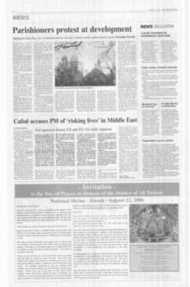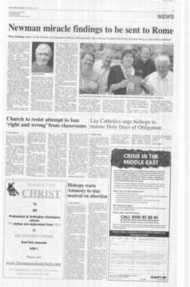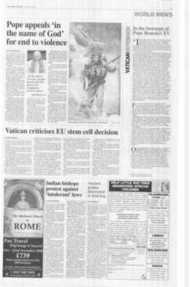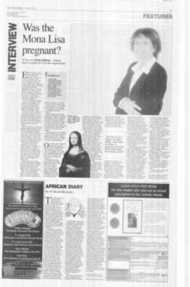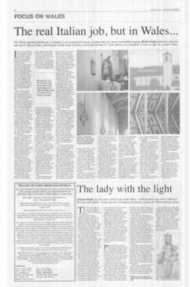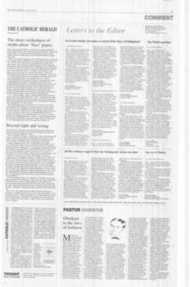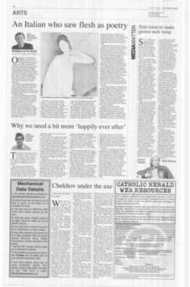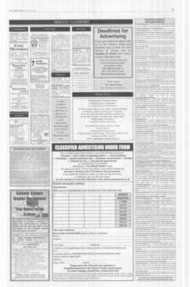Page 1, 4th August 2006
Page 1
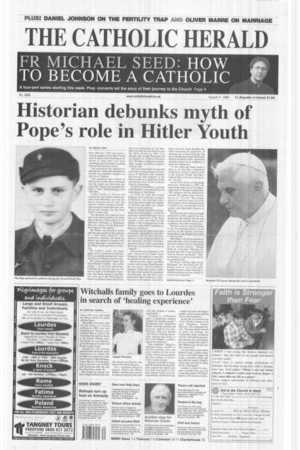
Report an error
Noticed an error on this page?If you've noticed an error in this article please click here to report it.
Tags
Share
Related articles
The Sheer Wickedness Of Myths About 'nazi' Popes
Vatican Plans To Open Secret War Archives
‘there Was Nothing
British Cardinal Thanks God For The New Pope
The Catholic Herald
Historian debunks myth of Pope's role in Hitler Youth
BY FREDDY GRAY
POPE BENEDICT XVI was never a willing member of the Hitler Youth and his family did everything in its power to stop their son from enrolling in the movement. a leading German historian has found.
The revelations are expected to debunk the widely held idea that the Pontiff was somehow complicit in the evils of Nazism.
This prejudice was evident in Britain last month when it emerged that the singer and television star Charlotte Church had branded the Pope a "Nazi" during filming of her chat show.
Volker Laube, a 36-year-old scholar who has written extensively about Pope Benedict, says that his latest research proves that the Pontiff's family resisted considerable pressure to enrol their two sons, Georg and Joseph, into the Nazi Party's youth wing.
The historian was asked to look into local church archives by Peter Pfister, director of the archives for St Michael's Seminary in Traunstein, Bavaria, where Joseph Ratzinger first trained to be a priest.
Mr Pfister was moved to action after he gave access to the archives to a New York journalist who returned to America and wrote an article, but omitted to mention that Joseph Ratzinger's membership of the Hitler Youth had been involuntary.
Mr Laube's work has been approved for publication in Rome, and was recently presented to Cardinal Wetter of Munich and Frei sing.
Mr Laube reportedly claims that Pope Benedict's father — also called Joseph — an anti-Nazi policeman, scrimped and saved to pay for his sons to study at St Michael's Seminary. The family refused to sign their two boys up to the Hitlerjugend, which would have meant the tuition fees were subsidised by the state. But even after he was forced to join the Hitler Youth, in 1941, it is thought that Joseph Ratzinger did not qualify for reduced education fees. The Nazis continued to discriminate against unwilling members (Zwangs-H.1).
The new research also reveals that even before Joseph began his training at St Michael's, the seminary had already been targeted by the Nazis as part of a crackdown on the dissenting voice of the Catholic Church in Germany.
In 1934 Fr Josef Stelze, a teacher at St Michael's, was arrested for not conforming to Nazi ideals.
In 1939, the year that Joseph Ratzinger first joined the seminary, St Michael's was combined with a local state school where the majority of students and staff were sympathetic to fascist ideology.
Many Catholic historians and journalists have attempted to counter the myth that Cardinal Ratzinger was in any way supportive of the Nazi regime, a slur that added to the Prefect of the Congregation for the Doctrine of the Faith's reputation as the panzerkardinal.
Leading Jewish figures have also repeatedly defended the Pontiff's reputation. Rabbi David Rosen, director of inter-religious affairs for the American Jewish Committee, described stories which accentuated the Pope's connection to Nazism as "rubbish".
"Enrolment was compulsory," he said. "And even if it hadn't been obligatory, the mark of a man isn't his childhood, but who he is today."
Observers have often remarked on how much energy Pope Benedict has devoted to Jewish-Catholic dialogue. In May this year he visited the Nazi death camps of Auschwitz and Birkenau. He said that it was particularly hard for him as a Christian and as a German to visit such a
place of horror. Pope Benedict has often discussed his memories of growing up in Nazi Germany. He once told Bavarian State Radio that Nazism had held a brief, superficial attraction based on its emphasis on sport and athleticism.
"It was when the Nazis made it clear to me that they condemned Christianity because it had its roots in the despised Jewish faith that I realised their creed was nothing for me," he said.
In Salt of the Earth, a book-length interview published in 1997, the future Pope spoke of how his father's opposition to Nazism inspired him. "His religion and his antagonism towards the regime were convincing to us," he said. "His simple power to convince came out of his inner honesty. So his attitude became a model for us, even though it stood against what had public currency at the time."
The Pope has also written at length about how in 1943, aged 16. he was drafted into the military. He was sent to man an anti-aircraft defence post in Munich with other seminarians.
The next year he was transferred to the Reichsarbeitsdienst (work service of the Reich) and then dispatched to the Hungarian border to dig trenches.
After Hitler's suicide he decided to desert the army. As he sneaked away from his barracks he was confronted by two armed soldiers. "Thank God," he wrote later. "That they too had had their fill of war and did not want to become murderers." They waved him on, and he went hack to his parental home.
The Pope's brother, Mgr Georg Ratzinger, has described how his family used to sit in the dark, huddled around a radio, listening to Allied broadcasts at a low volume so as not to be overheard.
Editorial Comment: Page 11
blog comments powered by Disqus



